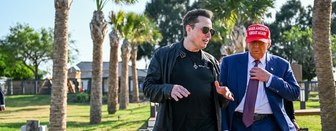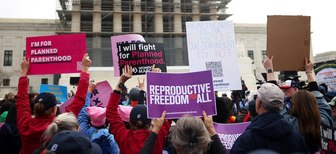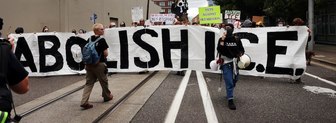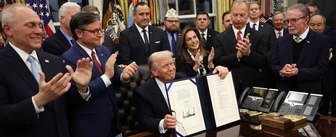The French public express almost unanimous committment to freedom of the press, but many don't want to see individual liberties curtailed in the aftermath of the Charlie Hebdo attacks
Following the deadly shooting at the offices of satire magazine Charlie Hebdo, the world’s eyes have turned to France. The phrase “Je suis Charlie” (“I am Charlie”) has become a slogan for people around the world to show solidarity with the French people and the principles of free speech. YouGov’s polling has already shown the defiant response urged by people looking on from Britain and the United States. But how do the French themselves feel?
A YouGov survey conducted for the Huffington Post and French television channel i>Télé following the attacks reveals the French people overwhelmingly oppose press censorship. 89% of French adults agree with the statement that “Freedom of the press is a fundamental freedom of the [French] Republic and must be defended at all costs”. Two-thirds (68%) strongly agree. Only 7% disagree with the statement, while 5% don’t know.
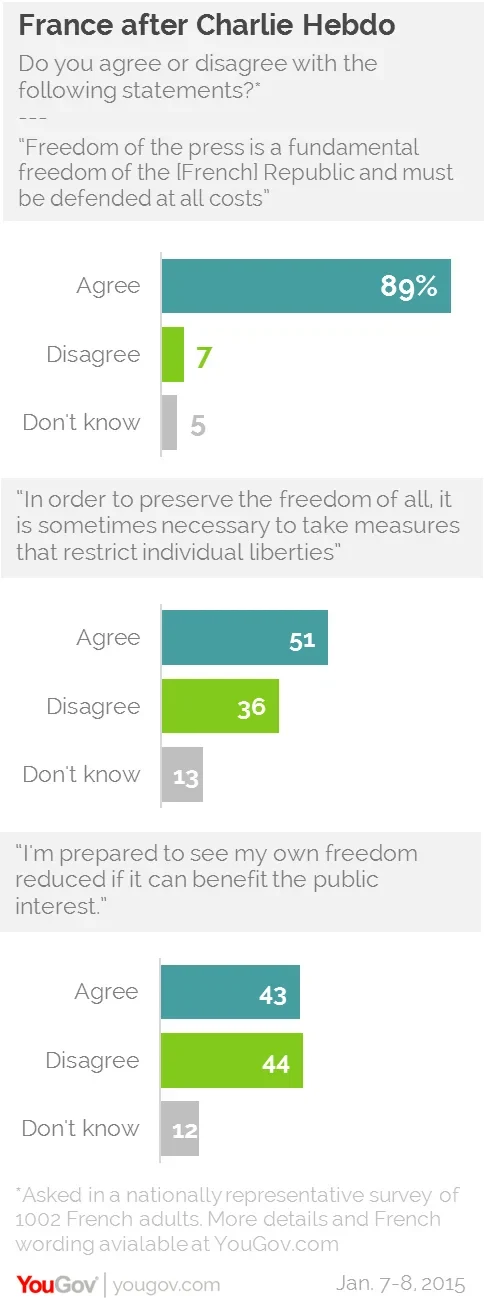
The response
French public opinion is more nuanced when it comes to the trade-off between individual liberty and security. In France the attacks have spurred discussion of whether there will be a “French Patriot Act” – a reference to the U.S. legislation passed after 9/11 that vastly expanded the government’s surveillance powers and counter-terrorism capacities – and Socialist Party Prime Minister Manuel Valls told the national assembly “exceptional measures” to be taken in response to ongoing threats.
A narrow majority (51%) of French people agree that it’s sometimes necessary to take measures to restrict individual liberties to “preserve the freedom of all”, while 36% disagree (13% don’t know). Fewer are prepared to sacrifice some of their own personal freedoms to benefit “the public interest”. 43% say they would do so, versus 44% who said they would not. 12% are undecided.
But the poll also revealed a sense of insecurity amongst a large group of the public in the immediate aftermath of the attacks, which lasted for three days as the Charlie Hebdo killers fled. When the survey was conducted, from January 7th, the day of the initial attack, to January 8th, the killers still had not yet been caught. At this point three in ten French people (31%) felt personally threatened by a terrorist attack.
The French government
The Paris attacks have been called “the French 9/11” for the comparable psychological impact it has had on the country, and for the sense of national unity that emerged immediately afterwards. In a poll conducted immediately after after the 9/11 attacks, George W. Bush’s approval rating with Gallup shot up 35 points to 86% as the country rallied around their president.
The French government, which has been deeply unpopular, does not enjoy such widespread support. Public approval of French President François Hollande is essentially unchanged at 16%, from 14% in December. Three-quarters (76%) disapprove, down marginally from 80%. Overall approval of the government is similarly low: 15% approve and 77% disapprove.
Notably, the poll was conducted while the killers were still on the loose, and before the massive January 11th national unity rally – the largest rally of its kind since the Allies liberated France from the Nazis.



